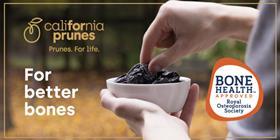
In a new study, researchers from Pennsylvania State University, US, found that daily prune consumption preserved bone mineral density (BMD) at the hip and protected against increased fracture risk in postmenopausal women.
The study findings were presented at the World Congress on Osteoporosis, Osteoarthritis and Musculoskeletal Diseases – the leading clinical conference on bone, joint, and muscle health.
BMD is known to decrease rapidly after menopause and women over the age of 50 are more likely to experience hip fractures, which commonly lead to hospitalisation, diminished quality of life, loss of independence and shortened life span. This research is the first to demonstrate a favourable effect of prune consumption on BMD at the hip and points to prunes as a food-based therapeutic option for protecting bone health.
“It is exciting that the data from our large randomised controlled trial in postmenopausal women showed that consuming five to six prunes a day demonstrated the benefit of protecting from bone loss at the hip,” says Principal Investigator Mary Jane De Souza, PhD, FACSM, Distinguished Professor, Pennsylvania State University. “Our data supports the use of prunes to protect the hip from bone loss post menopause. Indeed, these data may be especially valuable for postmenopausal women who cannot take pharmacological therapy to combat bone loss and need an alternative strategy.”
Previous clinical trials in postmenopausal women have shown the promising effects that daily prune consumption can have on preventing bone loss This new study represents a milestone in prune research as it is the largest clinical trial to date with a sample size of 235 postmenopausal women.
The results showed that women who consumed 50 grams of prunes (5-6 prunes) a day for one year maintained hip BMD while those who ate no prunes (control group) lost significant bone mass at the hip. Furthermore, hip fracture risk went up in the control group compared to the prune eaters who were protected from any increases in fracture risk.
“Just a handful of prunes can easily be added to anyone’s lifestyle,” says registered dietitian, professional nutritionist and California Prune Board Health Ambassador, Jo Travers BSc RD MBDA. “Prunes pair with so many flavours and textures and work well for individualized nutrition plans. Mix them into salads, trail mixes, smoothies, savoury dishes – you name it. The naturally sweet flavour of prunes makes them a versatile ingredient or convenient snack for anyone.”
Under 100 calories per serving, California Prunes are a nutrient-dense fruit that packs a powerful punch of vitamins and nutrients known to influence bone status, namely boron, potassium, copper, and vitamin K. Prunes are also rich in phenolic compounds which act as antioxidants. Enjoyed globally, California Prunes are always in season, require no refrigeration, and are an accessible and nutritious snack for overall wellbeing.



